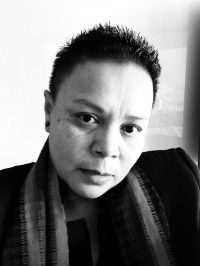
Martha Carrillo is a lesbian women engaged in HIV work in Belize.Global LGBTIQ advocates to attend OutRight’s annual Advocacy Week in New York City
Global LGBTIQ advocates will once again convene this December at OutRight’s annual Advocacy Week in New York City. The ten-day event will have advocates amass for trainings and meetings with U.N. representatives to discuss global LGBTIQ issues. This invaluable collaboration between advocates will culminate at OutSummit, the capstone meeting where attendees are invited to discuss unique social and political issues that LGBTIQ people face in a diverse range of nations.
Martha Carrillo is a lesbian women engaged in HIV work in Belize, and Latin America and the Caribbean more broadly. She was the co-founder of the first ever NGO providing support to persons living with HIV, in particular men who have sex with men. She has also served as the Director of the National AIDS Commission and owns her own consultancy company providing technical assistance in the areas of human rights, advocacy training, and capacity building for key affected populations. She is the founder of an online support/social group for lesbians and bi women called W4W Belize (women4women) and a Counseling Psychologist by profession.
OutRight Magazine interviewed Martha on what led her to become an advocate for LGBTIQ rights and her current work in the Caribbean.
OutRight: What experiences first made you aware of the need to advocate for LGBTIQ rights? How did you first get involved with your earliest experiences and current organization?
Martha: Being a lesbian in a highly discriminatory society such as the one I grew up in was an everyday challenge. Coming to the realization that I was a lesbian as a young high school teacher (20yrs), I felt guilty and dirty among young persons who were looking up to me as a role model. When I went away to study in the US my whole life changed. I fell into a society where the topic of being gay was not a taboo. I was able to find myself, explore my sexuality and form important LGBTI networks. Upon returning to Belize I promised that I would be visible and available to help all young LGBTI persons in their coming out process so that they would know that our reality in Belize was based on ignorance, lack of exposure and a violation of our human rights.
OutRight: How have global politics impacted your work?
Martha: As a psychologist and an HIV consultant, I have had the opportunity to see HIV and its impact on our community from different perspectives including support services, addressing prevention for affected populations like men who have sex with men (MSM), addressing stigma and discrimination, human rights and creating an enabling environment. I have regional and global exposure to platforms that have educated, inspired and moved me to do as much as I can as a consultant, activist and advocate for the LGBTI community to decrease their vulnerabilities to the epidemic.
OutRight: Why is it important to be a part of advocacy week and how will that impact the work that you will do at home?
Martha: Every opportunity to learn and network is an important opportunity. I have heard from other LGBTQI colleagues and peers of their experience in Advocacy Week and have seen their growth because of this process. I want and need that for myself so that I may be better equipped and greater inspired to continue my work.
OutRight: What are some local social or political obstacles you and your organization currently face?
Martha: High-level institutionalized stigma and discrimination; high level of self-stigma among the community itself; high level of resistance and opposition from fundamentalist churches.
WHAT IS PANCAP?
PANCAP is a Caribbean regional partnership of governments, regional civil society organisations, regional institutions and organisations, bilateral and multilateral agencies and contributing donor partners established on 14 February 2001. PANCAP provides a structured and unified approach to the Caribbean’s response to the HIV epidemic, and coordinates the response through the Caribbean Regional Strategic Framework on HIV and AIDS to maximise efficient use of resources and increase impact, mobilise resources and build the capacity of partners.
What are the Global AIDS Strategy 2021–2026 targets and commitments?
If targets and commitments in the strategy are achieved:
- The number of people who newly acquire HIV will decrease from 1.7 million in 2019 to less than 370 000 by 2025
- The number of people dying from AIDS-related illnesses will decrease from 690 000 in 2019 to less than 250 000 in 2025.
- The goal of eliminating new HIV infections among children will see the number of new HIV infections drop from 150,000 in 2019 to less than 22,000 in 2025.
What are the 95-95-95 Targets for ending AIDS?
- 95% of People Living with HIV know their HIV status;
- 95% of people who know their status on treatment; and
- 95% of people on treatment with suppressed viral loads.
HELPFUL LINKS:
Global AIDS Strategy 2021–2026, End Inequalities, End AIDS
https://pancap.org/pancap-documents/global-aids-strategy-2021-2026-end-inequalities-end-aids/
Caribbean Regional Strategic Framework on HIV and AIDS (CRSF) 2019-2025
https://pancap.org/pancap-documents/caribbean-regional-strategic-framework-2019-2025/
